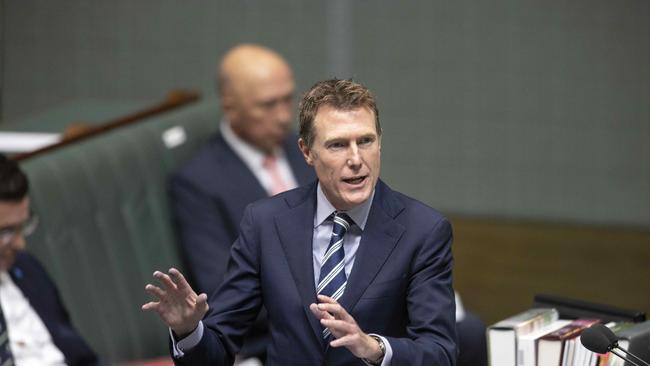Family law fees targeted for reform
Christian Porter will turn his focus to cracking down on legal bills disproportionate to the amounts in dispute in family law cases after implementing a historic courts restructure.

Attorney-General Christian Porter will tur
Legislation to merge the Family Court and lower-level Federal Circuit Court was passed by the parliament on Thursday, despite strong opposition from legal groups that warned that the reform would lead to a loss of specialist expertise.
Mr Porter told The Australian the restructure was always intended to be the foundation for further reform of the family law system, and said the issue of keeping costs down for families was of “prime importance”.
“There remains issues with legal fees, question marks over the necessity of some processes that are clearly being recommended by lawyers (and) disappointment fees (sometimes charged by barristers when cases settle ahead of a trial) are outrageous,” he said.
“Now that we’ve fixed the problem of inefficient structures in the court system, one of the things I will be looking at is the way in which there has been a tendency in some places at some times for fees to be excessive when considered in light of the size of the pool that was being argued about.”
The Family Court and Federal Circuit Court will continue to operate as two separate divisions of the new Federal Circuit and Family Court.
South Australia will gain an extra three family judges and $14.3m in legal assistance funding as part of a deal struck with crossbench senator Rex Patrick to secure the passage of the bill.
Mr Porter said the restructure would help families deal with their matters more quickly and at a lower cost. It would create a single entry for families so they were no longer bounced between different courts.
He said many of the loudest voices making “wild assertions” about the changes had a vested interest in maintaining a status quo that fuelled delays and rising costs.
The Law Council of Australia had warned that collapsing the specialist Family Court of Australia, established in 1976 by the Whitlam government, into the generalist Federal Circuit Court would put vulnerable families at risk.
President Jacoba Brasch QC said the Law Council remained committed to working with the Attorney-General on family law reforms. “The best interests of families and children are at the heart of what we do and will remain so,” she said.
Opposition legal spokesman Mark Dreyfus said the restructure was a “shameful act” by a “government of wreckers” and would not fix the courts’ problems. “It will make a bad situation worse for Australian families including vulnerable children,” he said.
Lawyers have long called for better resources for the family law system. Litigants regularly face delays of more than three years to resolve their disputes, and many lower-level judges are handling more than 300 cases at a time, and some as many as 600 cases.
Mr Porter said he was open to looking at any changes that might be recommended by Family Court Chief Justice Will Alstergren now that the restructure had been implemented, including to the court’s resources and operating hours.
He said the government would respond “imminently” to the Australian Law Reform Commission’s 2019 report into the family law sector, which recommended numerous changes to simplify the law and improve the courts’ response to domestic violence.
He also expected to implement changes in response to a parliamentary inquiry chaired by Liberal backbencher Kevin Andrews and Senator Hanson, which is likely to report next month.





To join the conversation, please log in. Don't have an account? Register
Join the conversation, you are commenting as Logout